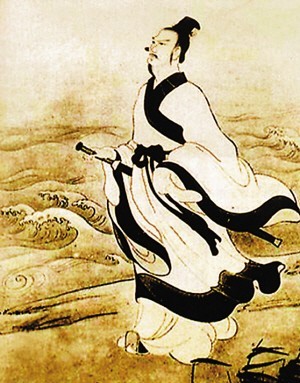Qu Yuan
Qu Yuan (ca. 340 BCE–278 BCE) was a Chinese scholar and minister to the King from the southern Chu during the Warring States Period (BC 475-221). His works are mostly found in an anthology of poetry known as Chu Ci. His death is traditionally commemorated during the Duanwu Festival (Dragon Boat Festival), which is commonly known in English as the Dragon Boat Festival or Double Fifth (fifth day of the fifth month of the traditional Chinese calendar).

(Source: china.com.cn)
Qu Yuan, born in the Xiling Gorge area of what is today western Hubei province, was a minister in the government of the state of Chu. He was descended from nobility and was a champion of political loyalty and truth, eager to maintain the Chu state's power. Qu Yuan advocated a policy of alliance with the other kingdoms of the period against the hegemonic Qin state, which threatened to dominate them all. Legend has it the Chu king fell under the influence of other corrupt, jealous ministers who slandered Qu Yuan and banished his most loyal counselors. It is said Qu Yuan returned first to his family's home town. In his exile, he spent much of his time collecting legends and rearranging folk odes while travelling the countryside, producing some of the greatest poetry in Chinese literature and expressing fervent love for his state and his deepest concerns for its future.
Qu Yuan is regarded as the first author of verse in China to have his name associated to his work. Prior to that time, poetic works were not attributed to any specific authors. He is considered to have initiated the “sao” style of verse which is named after his work Li Sao, in which he abandoned the classic four-character verses used in poems of Shi Jing and adopted verses with varying lengths. This resulted in poems with more rhythm and latitude in expression. Qu Yuan is also regarded as one of the most prominent figures of Romanticism in Chinese classical literature and his masterpieces influenced some of the greatest Romanticist poets in the Tang Dynasty (618-907 AD) such as Li Bai.
Other than his literary influence, Qu Yuan is also held as the earliest patriot in China's history. His social idealism and unbending patriotism have served as the model for Chinese intellectuals to this day, particularly following the establishment of new China in 1949. For example, in the 1950s, China issued a postage stamp bearing the likeness of Qu Yuan.
Source: en.wikipedia.org
Editor: Xu Xinlei
|

